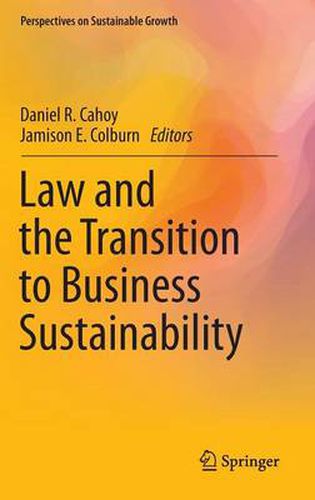Readings Newsletter
Become a Readings Member to make your shopping experience even easier.
Sign in or sign up for free!
You’re not far away from qualifying for FREE standard shipping within Australia
You’ve qualified for FREE standard shipping within Australia
The cart is loading…






This title is printed to order. This book may have been self-published. If so, we cannot guarantee the quality of the content. In the main most books will have gone through the editing process however some may not. We therefore suggest that you be aware of this before ordering this book. If in doubt check either the author or publisher’s details as we are unable to accept any returns unless they are faulty. Please contact us if you have any questions.
This book expands on law-related research by examining the legal aspects of sustainability with a focus on the impact on business strategies. It recognizes that firms must adopt an integrated approach to law and sustainability, considering multiple disciplines and goals, and serve as a forum for bringing together scholarship from fields such as environmental law, energy, government regulation and intellectual property. Firms increasingly have an interest in transitioning to sustainable business practices that take into consideration the fact that global resources are finite and will be increasingly scarce. They acknowledge that current actions have social, economic and environmental consequences and employ options to ensure that future generations have the same options and benefits. Examples of sustainable practices increasingly employed by firms include the institutionalization of whole life-cycle analysis in marketing and product design, utilization of sustainable inputs and energy sources, tracking and reporting sustainability performance, attempting the valuation of future generation prosperity and happiness as a discounting mechanism, and integrating sustainability into firm culture and management goals. It is clear that law and regulation have an extremely important role to play in the transition to more sustainable business practices. Broadly stated, law can provide structure for firms responding to forces that pull transition by enabling sustainability leadership and competitive advantage through funding models, intellectual property rights and collaboration means. Additionally, law can work to push transition by compelling firms to act through regulatory structures, accounting and governance mechanisms.
$9.00 standard shipping within Australia
FREE standard shipping within Australia for orders over $100.00
Express & International shipping calculated at checkout
Stock availability can be subject to change without notice. We recommend calling the shop or contacting our online team to check availability of low stock items. Please see our Shopping Online page for more details.
This title is printed to order. This book may have been self-published. If so, we cannot guarantee the quality of the content. In the main most books will have gone through the editing process however some may not. We therefore suggest that you be aware of this before ordering this book. If in doubt check either the author or publisher’s details as we are unable to accept any returns unless they are faulty. Please contact us if you have any questions.
This book expands on law-related research by examining the legal aspects of sustainability with a focus on the impact on business strategies. It recognizes that firms must adopt an integrated approach to law and sustainability, considering multiple disciplines and goals, and serve as a forum for bringing together scholarship from fields such as environmental law, energy, government regulation and intellectual property. Firms increasingly have an interest in transitioning to sustainable business practices that take into consideration the fact that global resources are finite and will be increasingly scarce. They acknowledge that current actions have social, economic and environmental consequences and employ options to ensure that future generations have the same options and benefits. Examples of sustainable practices increasingly employed by firms include the institutionalization of whole life-cycle analysis in marketing and product design, utilization of sustainable inputs and energy sources, tracking and reporting sustainability performance, attempting the valuation of future generation prosperity and happiness as a discounting mechanism, and integrating sustainability into firm culture and management goals. It is clear that law and regulation have an extremely important role to play in the transition to more sustainable business practices. Broadly stated, law can provide structure for firms responding to forces that pull transition by enabling sustainability leadership and competitive advantage through funding models, intellectual property rights and collaboration means. Additionally, law can work to push transition by compelling firms to act through regulatory structures, accounting and governance mechanisms.